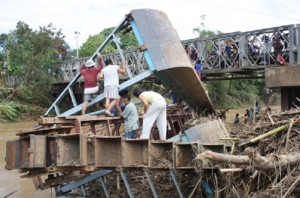
INQUIRER MINDANAO FILE PHOTO
ILOILO CITY—“Every time I close my eyes, I keep seeing my friends and fellow workers who died,” recounted Rodrigo, who said that he had not slept for the past two days.
Rodrigo spoke to the INQUIRER by phone on condition of anonymity because he does not have permission to speak to reporters.
He was just a few meters from the 13 workers who were buried by tons of muddy soil, said Rodrigo, who barely survived the collapse Wednesday night of part of the western wall of the Panian mining pit operated by the Semirara Mining Company.
SMC, the country’s largest coal producer, is on Semirara Island in Caluya town, Antique. The company suspended its operations after the incident that saw 10 miners buried alive. Three others managed to get out.
As of Friday afternoon, seven bodies have been recovered, while three more remained missing, according to Undersecretary Ramon Allan Oca of the Department of Energy that sent a team to the island to investigate the incident.
But Caluya police chief Senior Insp. Rico Andanza said only five bodies were recovered, although the rescue teams believed they had located more bodies because of the stench coming from the area they were digging.
Rodrigo, who has been working for the mining company for more than 10 years, recalled that the 13 workers buried by tons of muddy soil were part of the 6 p.m. to 6 a.m. shift, and were having coffee at the bottom of the two-level pit shortly before midnight on Wednesday.
At 8 p.m., the workers noticed debris sliding from the wall. They chose to ignore it and continued working. A few hours later, at 11 p.m., more debris started sliding down the wall, followed by a bigger slide some 30 minutes later.
Already feeling anxious, Rodrigo maneuvered the equipment he was operating 10 meters further away from the path of the debris. As he was moving away, he heard a loud rushing sound.
“It sounded like a very loud thunder,” he recalled.
He continued to maneuver the equipment further away as more debris fell.
“(Then) I heard shouts from my fellow workers who were below (the two-level pit),” he recounted. “When I glanced back, I saw the half-buried hand of one of my friends, (as if) asking for help,” he said.
Rodrigo ran 20 meters to the next higher level of the pit that led to the exit, where fellow workers and rescuers soon gathered.
Hours after the tragedy, he managed to go home. He immediately hugged his wife and children, and wept. “I cannot be more thankful for being alive,” he said.
Rodrigo said he went back to the company infirmary several times to check if the other miners had been recovered.
He hoped his fellow workers would still be found alive but already, his hopes were dimming.
“I doubt if anyone could have survived what I saw,” he said.
Rescuers were fighting against time to locate the five missing workers buried under tons of muddy soil.
Some 50 SMC workers were involved in the search for the missing workers, all of whom were operators of heavy equipment, according to Juniper Barroquillo, SMC administrative manager.
“We are doing all that we can to find them,” Barroquillo told the INQUIRER in a telephone interview. He added that the search and recovery operations were being undertaken solely by company personnel.
“We did not ask (for) assistance because we have the equipment and the personnel for the search and rescue operations,” Barroquillo said.
Energy Secretary Carlos Jericho Petilla was here Friday to inspect the site and check rescue and recovery efforts at the Panian Pit located at the northern end of the 5,500-hectare Semirara Island.
The cause of the incident is still being determined by mining engineers sent by the DOE.
“We want to determine the cause but we do not want to rush the investigation because we want it (to be) as exhaustive as possible,” said Oca.
The Energy undersecretary said the results of their investigation would determine if a further investigation of the mining site was necessary.
But a non-government organization involved in occupational and environmental health and safety issues, said “a complete and thorough investigation” should be conducted on SMC before it could be allowed to resume operations.
According to Noel Colina, executive director of the Institute for Occupational Health and Safety Development (IOHSAD), “Rule 1012.02 or the Abatement of Imminent Danger of the Occupational Safety and Health Standards (OSHS) allows the Labor department to shut down the operation and require the company (to institute) specific measures to correct dangerous practices.”
Colina said the International Labor Organization considered the mining industry as one of the most hazardous occupations.
Citing IOHSAD records, Colina said there were 84 deaths in the mining industry in 2009, 26 in 2010 and 14 in 2011.